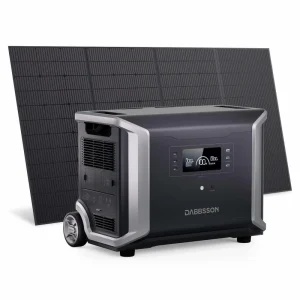A solar generator is a cost-effective and eco-friendly alternative to a traditional gas-powered generator on the market, providing tons of benefits for emergency or off-grid scenarios. With a zero emissions profile, these generators also contribute to lowering carbon footprints in the context of increasing move towards renewable energy. Solar capacity expanded 25% each year in the past years, based on research from the International Energy Agency which is a sure sign of growing listening to the thinking public and their demands for viable solutions. Crucially, while gas generators give out pollution and noise, solar powered generator run silently making them perfect for indoor or outdoor use.
From an economic standpoint, a solar powered generator can provide significant savings. Although a high-capacity system like the DBS2300Plus costs $1,000-$3,000 at its most basic level, these systems end up saving users in the long run because of their low maintenance nature and fuel cost efficiency. Diesel generators need continuous fuel for operation while gas generator become costly year by year due to the average cost of fuel hit $4 per gallon in 2023. Note: If you are into the fancy business of solar generators, they do pay themselves back with all said savings and additionally they do not come with associated recurrent costs like gas engines that require fuel, oil changes etc. since Solar panels and lithium batteries almost need zero maintenance efforts.

Solar generators are highly reliable because of advancements in battery technology. Even at the lower end of that range, lithium-ion and its more resilient sibling, lithium iron phosphate (LiFePO4), can endure 2,000-5,000 cycles or in a best-case scenario over 10 years. They maintain a maximum of 90% efficacy for long and sustained power storage. Additionally, models using Maximum Power Point Tracking (MPPT) technology, like the DBS2300Plus maximize sunlight intake and efficiency even during cloudy days for more efficient recharging. MPPT adds up to 30% more energy absorption and longer runtimes and faster recharge cycles.
This makes a solar power generator the perfect portable back-up for keeping things like refrigerators, lights, medical equipment running in an emergency when the grid goes down. This enables a 2,300-watt model to power a typical fridge for 10-15 hours on one charge – good if you're worried about running out of fuel from the pump. Energy analyst Amory Lovins says, “The best energy source is one that doesn’t pollute”; the fact it has absolutely zero emissions both environmentally and orally… makes solar generators better than traditional sources.
When Do You Use a Solar Generator? Solar generators are there for cost-efficiency, dependability and clean power that makes it an intelligent investment. A solar generator that is capable of supporting essential needs with renewable energy provides an optimal combination of practical and eco-friendly objectives.